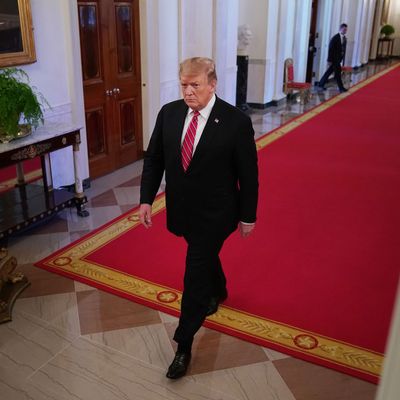
The most revelatory details in Robert Mueller’s largely familiar report concerned the repeated refusal of President Trump’s aides to carry out his most Nixonian demands. It was probably because these details were new that they formed the basis for the narrative that has taken shape around the report: that Trump has behaved irrationally and ineffectually, attempting to abuse his powers without doing any real damage. That conclusion is far too optimistic.
Trump’s attempts to quash the Russia investigation outright may have failed, but his efforts to impede it succeeded. Mueller failed to establish a criminal conspiracy between the Trump campaign and Russia in part because he could not nail down the activities of two Trump advisers: Roger Stone and Paul Manafort. A redacted sentence in the report states, “The investigation was unable to resolve … WikiLeaks’s release of the stolen Podesta emails on October 7, 2016,” it concedes. It likewise failed to establish why Manafort delivered 75 pages of detailed polling analysis to a Russian agent.
Stone and Manafort both declined to cooperate with the investigation. In both cases, Trump sent a combination of public and private messages encouraging both men to stay loyal, and floating the promise of pardons if they did. Of course, we can’t say for certain that their testimony would have proven the conspiracy charge. But at the very least, Trump’s ability to dangle pardons played a crucial role in producing the outcome — no conspiracy charges —that he desired.
A second, underappreciated aspect of Mueller’s probe is that it steered almost totally clear of any counterintelligence issues. The most important question hovering over Trump is not whether he illegally cooperated with Russian hackers, it’s whether Russia gained secret influence over him. That is not a question Mueller’s report sets itself to answer. “The Mueller investigation was a criminal probe,” writes Benjamin Wittes. “Full stop. It was not a counterintelligence probe.”
A few stray clues are lying about. Mueller failed to conclude exactly what Carter Page did during his trip to Moscow, or just how a long-standing target of FBI counterintelligence came into Trump’s orbit to begin with. The report contains a brief, tantalizing reference to one of Michael Cohen’s Russian contacts texting that he “Stopped flow of tapes from Russia but not sure if there’s anything else.” The section implies that Trump had at least some fear, whether justified or not, that the Kremlin possessed incriminating video, but leaves the question open.
The biggest source of leverage is sitting in plain sight. Mueller proved that Trump was chasing a building deal in Moscow that promised to deliver a profit of several hundred million dollars, with no risk on his part. Making a deal like that is not a crime, nor is lying about it, as Trump did. But from a counterintelligence standpoint, having a president secretly in hock to a hostile adversary is a crisis event.
How much additional leverage Russia maintains over the president remains mysterious. His sons have famously conceded in the past that Russia accounts for a huge and disproportionate share of their finding, but Mueller’s report does not divulge any financial information. The House is demanding Trump’s income tax returns — the mildest gesture in the direction of answering this question — but the administration is refusing to hand them over despite the plain-letter text of the law compelling their cooperation.
Notably, administration officials are not ignoring the president’s demands that they defy the law. They are digging in on the tax returns, and likewise refusing to accept subpoenas to testify on a host of additional scandals. The stonewalling includes congressional investigations of security clearances being improperly given to Jared Kushner, Don McGahn’s testimony about Trump’s illegal orders, and Trump’s involvement in his administration’s blocking of the AT&T–Time Warner merger — a move that looks suspiciously like presidential retaliation against CNN for its independent reporting. Trump simply refuses to acknowledge any legitimate oversight role by the putatively coequal branch, and Republicans have closed ranks behind him.
The Mueller report is not a story about how the system worked. It is a story of sweeping misconduct and a cover-up that may have worked. The fear of prosecution caused many of Trump’s lieutenants to shirk their loyalty. But that fear has dissipated now that Mueller has finished his work. And as the task of investigating Trump’s misconduct has passed into the hands of Congress, his party evinces no fear whatsoever in joining the president’s assault on the rule of law.






























